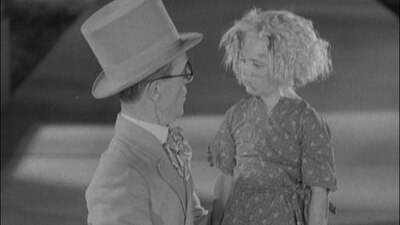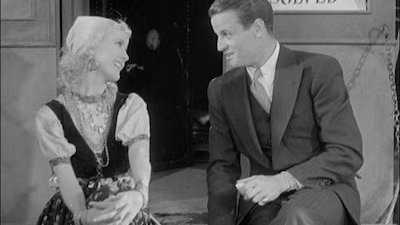Everything's Rosie

Brief Synopsis
Cast & Crew
Clyde Bruckman
Robert Woolsey
Anita Louise
John Darrow
Florence Roberts
Clifford Dempsey
Film Details
Technical Specs

Synopsis
In a small town in 1916, carnival tonic huckster Dr. J. Dockweiler Droop stumbles across Rosie, an abused orphan toddler, and unwittingly becomes her foster father. Fourteen years later, Rosie meets handsome law student Billy Lowe while traveling through a town with Droop and his rotating carnival act. Charmed by Billy, Rosie begs Droop to give up the nomadic life and settle in the town. The ever resourceful Droop, who had been posing as a fortune-teller, then convinces Al Oberdorf, a failing jewelry store owner, to hire him to auction off the store's merchandize. After a few weeks, Droop, an incorrigible braggart, saves the store from bankruptcy and, while Rosie falls in love with the equally enamored Billy, ingratiates himself with the townspeople. Just before Billy's twenty-first birthday, however, Rosie meets Madeline Van Dorn, Billy's sophisticated would-be fiancée, and concludes that Billy is not truly in love with her. Although hurt, Rosie agrees to attend Billy's birthday party with Droop, who has convinced Billy's parents that he is a nobleman of European extraction. At the party, Droop humors all of the well-to-do guests with his unabashed silliness, then tricks them into betting on a crooked shell game. While Droop is making a small fortune with his shells, Rosie overhears Billy tell Madeline that he wants to marry the orphan. Overjoyed, Rosie rushes to her father's side and insists that he play one last, honest game at double-or-nothing stakes. Although Droop returns his ill-gotten winnings, the suspicious town sheriff exposes the game as phony, and Droop and Rosie are forced to leave. Later that night, Droop is accused of robbing the jewelry store safe and is thrown in jail, while Rosie is sent to an orphanage. Eventually Droop escapes from the jail and rescues Rosie from the orphanage. While racing from the town, Droop and Rosie are overtaken by the sheriff and Billy, who announce that the real robbers have been apprehended. Rosie then happily accepts Billy's marriage proposal and says a tearful goodbye to her irrepressible foster father.

Director
Clyde Bruckman
Cast

Robert Woolsey

Anita Louise
John Darrow
Florence Roberts
Clifford Dempsey
Lita Chevret
Alfred James
Frank Beal
Crew

Videos
Movie Clip



Film Details
Technical Specs

Articles
Everything's Rosie
By Violet Levoit

Everything's Rosie
Quotes
Trivia
Notes
The working title of this film was Going, Going, Gone (also spelled Going! Going! Gone!). Robert Woolsey, who was part of RKO's popular comedy team "Wheeler and Woolsey," made his debut as a solo screen star in this production. According to an April 1931 Film Daily production news item, "an important event in sound recording was achieved when the...'Going! Going! Gone!' company succeeded in recording the rustling of leaves, bird calls and natural wind effects during a location trip to Sherwood Forest, 35 miles from Hollywood." The recording was accomplished by the "silencer and ground noise eliminator" invented by RKO sound man Hugh McDowell, Jr. A Film Daily news item adds William Halligan, James Quinn, George Chandler, Charles Gillette, Ford West, Edward Peil and Leo Willis to the cast, but their participation in the final film has not been confirmed.














